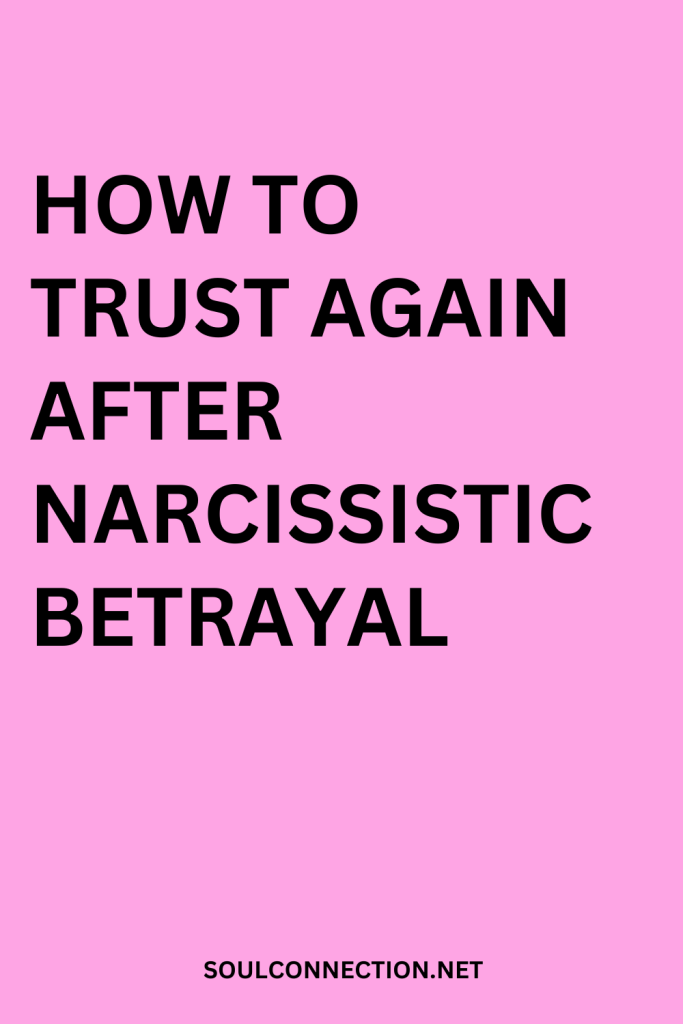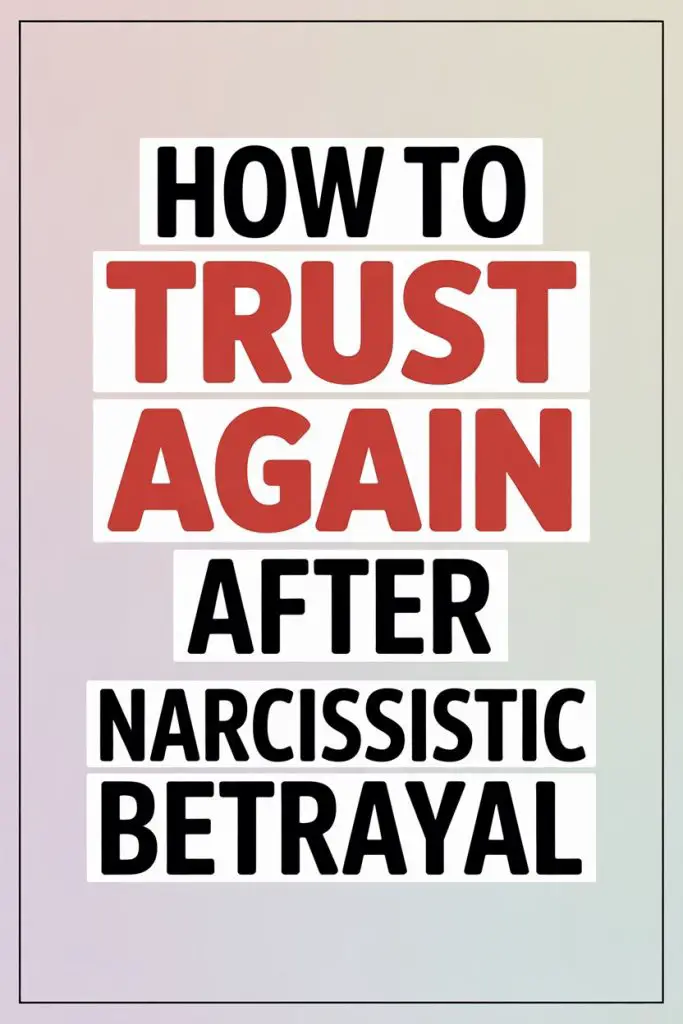Anyone who’s ever had their heart stomped by a narcissist will tell you: it’s not just the relationship that ends up in pieces, it’s your sense of reality (and, occasionally, your dignity at 2am as you Google “was my ex a sociopath or just a terrible texter?”).
Rebuilding trust after narcissistic betrayal isn’t about finding the next flawless soulmate to ride in on a unicorn.
It’s about learning how to trust yourself again, spot red flags before they smack you in the face, and maybe—just maybe—let other people back into your heart without needing to develop a side career as a private investigator.
Let’s wade through the emotional mud together.
Picking Up the Pieces (Without Channeling Your Inner CSI)
After a narcissist has done their thing, everything feels suspect.
Was that coworker being friendly, or are they plotting to steal your lunch and your self-esteem? Is your new date genuinely interested, or do they also keep a spreadsheet of everyone they’ve “accidentally” made cry?
That hypervigilance? Totally normal. Your brain is just doing its best to protect you, even if it’s a little overzealous. The trick isn’t to switch off your internal alarm system—it’s to recalibrate it.
Start by accepting that being fooled wasn’t a sign you’re gullible; it’s a sign that you gave someone the benefit of the doubt. That’s not a flaw. That’s being human.
Relearning the Art of Self-Trust
Narcissists are experts at gaslighting—twisting words, rewriting history, making you doubt your own intuition. Escaping that funhouse mirror means your inner compass needs a tune-up.
Begin with the small stuff. When something feels off—no matter how trivial—acknowledge the feeling. Did your friend’s backhanded compliment make your skin crawl? Did your date’s story about their “crazy ex” not quite add up?
Clock it. You don’t have to act (yet), just notice.
Journaling can help. Jot down those “hmm” moments when they happen. Later, you’ll see patterns—whether you’re picking up on real problems or dusting off last year’s trauma.
Trusting yourself is a muscle, and yours has been on bed rest. Start with baby steps.
Spotting Red Flags Without Drowning in Paranoia
Once you’ve been burned, everything looks like a fire hazard. “He ordered for me at dinner—narcissist!” “She likes to take selfies—RUN!”
While it’s tempting to see every quirk as a sign of doom, life isn’t an endless parade of emotional con artists.
Not every confident person is a narcissist. And, contrary to what Instagram might suggest, not every person who posts inspirational quotes is plotting your demise.
Instead of hunting for perfection, focus on consistency. Do their words match their actions? Do they apologize when they mess up, or do they stage a multi-part TED Talk about how you’re the problem?
Healthy people mess up, but they also own it. Narcissists deflect, blame, and rewrite reality. Keep an eye out for the difference.
Setting Boundaries Like an Absolute Boss
If boundaries used to be just a theoretical concept—like “portion control” or “clean eating”—welcome to the club. Narcissistic relationships bulldoze whatever fences you had in place.
Now’s your chance to build them back, bigger and sturdier than ever.
Decide what’s okay for you, and what’s not. Maybe you need to slow down new relationships. Maybe you no longer tolerate people raising their voices. Maybe you just want to keep your Netflix password to yourself (a small but mighty victory).
Whatever it is, state it clearly—without apologizing or tap-dancing around your own needs.
And when someone crosses a line? Practice saying, “That doesn’t work for me.” The sky will not fall. Your worth is not measured by how much nonsense you can tolerate.
Giving Yourself the Gift of Time
No one expects you to bounce out of narcissistic betrayal like a Jack-in-the-box on espresso. Take your time. Healing isn’t a cute montage set to a pop song.
Some days you’ll feel invincible; other days, you’ll wish you could crawl back under your duvet fortress. Both are progress.
If friends or family are pushing you to “just move on already,” smile politely and ignore them. Grief, anger, confusion—these are all normal. Give yourself permission to feel it all.
Pushing pain aside just promises it’ll pop up again, probably when you’re trying to enjoy a perfectly good cookie.
Reconnecting With Others (Without Losing Your Sanity)
Narcissists love to isolate, leaving behind a social life that looks a bit like a tumbleweed convention. Rebuilding your network can feel as awkward as the first day at a new school.
Start small. Accept a low-pressure invite. Reach out to old friends, even if it’s been ages. If the thought of dating makes you want to fake your own disappearance, that’s fine—nobody’s handing out prizes for “Most Recovered.”
Reclaiming your social life doesn’t have to mean jumping back into the deep end. Paddling in the kiddie pool is perfectly acceptable.
Therapy Isn’t Just for People on TV
If the aftermath of narcissistic betrayal has you rewinding every conversation and second-guessing your emotions, therapy can be a game-changer.
A good therapist helps untangle the emotional spaghetti, spot your patterns, and teach you that not every relationship is a ticking time bomb.
Think of therapy as emotional physio. Sure, you could try to fix that limp on your own, but why hobble when you could heal? No shame, just support.
Trusting Again Without Expecting a Magic Wand
At some point, the question creeps in: “Will I ever trust again, or am I destined to become a slightly bitter hermit with an encyclopedic knowledge of true crime documentaries?”
Trust isn’t about being naive or never making mistakes. It’s about choosing to hope again, knowing what you know now.
Take a risk, even a tiny one. Share something vulnerable. Let someone help you. Ask a new friend to coffee. The first time you trust, you may feel like you’re skydiving without a parachute.
The second time, you’ll realize you’ve got a pretty sturdy backup plan (and, worst case, you’re really good at landing on your feet).
When Someone New Actually Deserves Your Trust
Not everyone you meet is plotting your emotional downfall. Some folks will surprise you—with kindness, honesty, and the kind of steady affection you thought only existed in BBC period dramas.
The real magic happens when you recognize that you’re allowed to show up as yourself, warts and all, and see who sticks around. Let people earn your trust, little by little. Watch for actions over words.
Trust shouldn’t be handed out like Halloween candy, but it shouldn’t be kept in a vault, either.
Building a Trust-First Relationship With Yourself
All roads lead back to you. The best way to trust others again? Rebuild a rock-solid relationship with yourself.
Treat yourself with the gentleness you’d show a friend who’d been through hell. Celebrate small victories—the time you said no, the time you noticed a red flag and didn’t talk yourself out of it, the day you genuinely laughed again.
Trust isn’t a finish line, it’s a practice. One honest step at a time.
Trust After Narcissistic Betrayal Isn’t a Myth
Anyone who acts like trust is a light switch—off with betrayal, on with forgiveness—has probably never had their reality re-written by a narcissist. There’s a path back, but it’s not about finding the “right” person who’ll never hurt you.
It’s about honoring your instincts, setting boundaries, and letting yourself take cautious steps forward, even when your knees are knocking.
A little skepticism is healthy, but don’t let it talk you out of the good stuff.
The best relationships—romantic, friendly, or otherwise—are built by people who know what it’s like to lose trust and choose to rebuild it anyway.
You’re not broken. You’re just a little more selective about who gets a front-row seat.
And frankly, that’s not a flaw—it’s your superpower.


